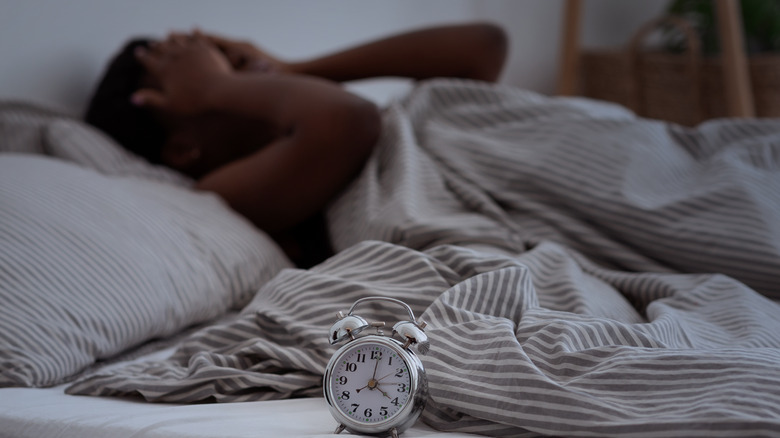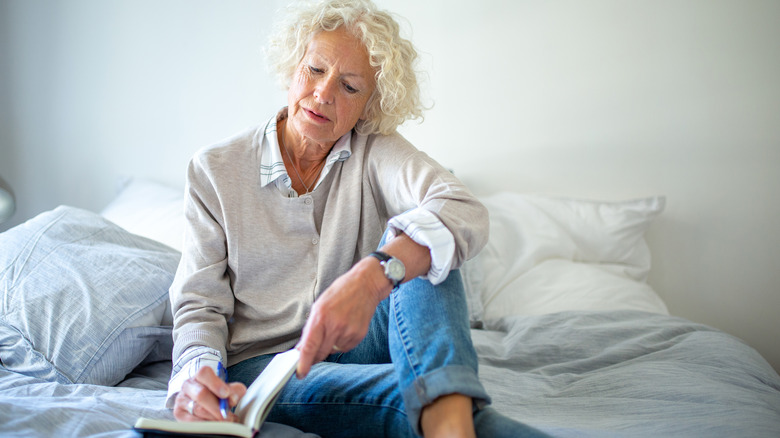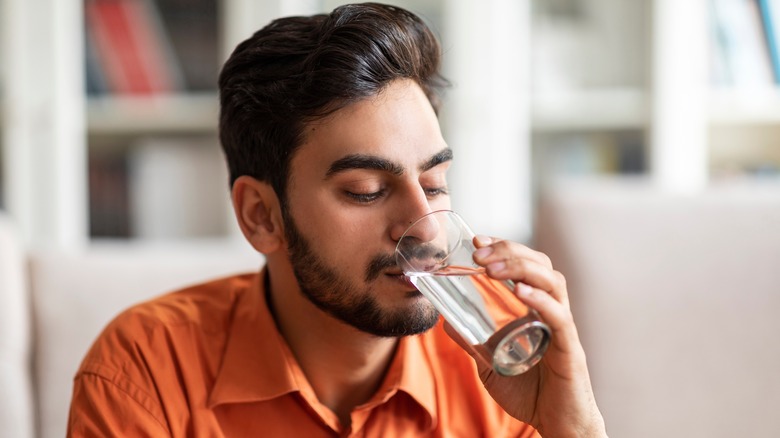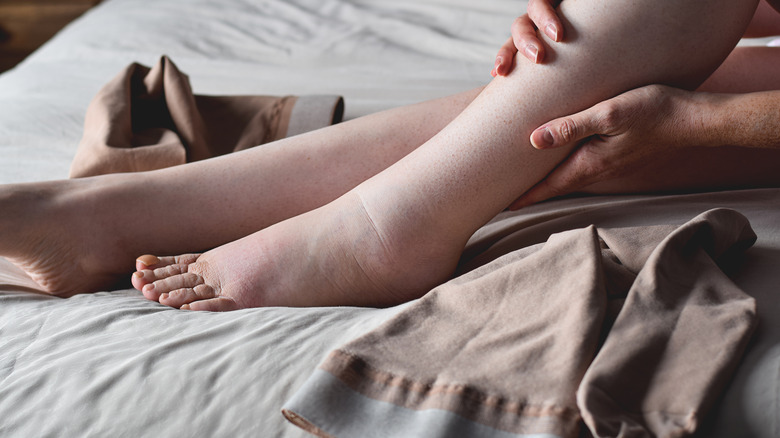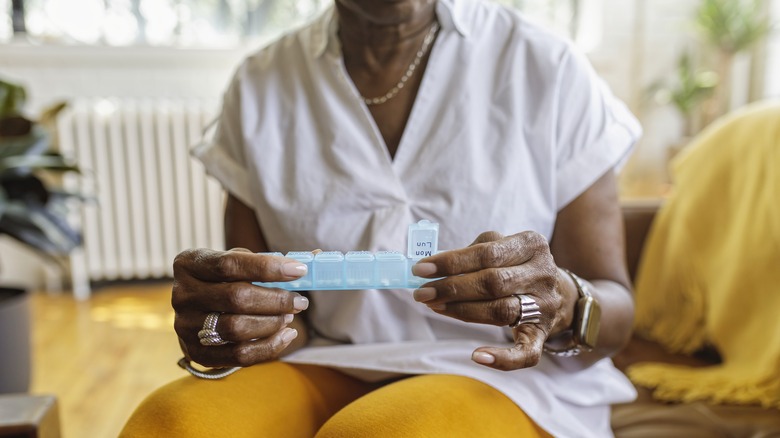How To Wake Up Less For Bathroom Breaks In The Middle Of The Night
There's nothing worse than placing your toothbrush back in the medicine cabinet, shutting off the bathroom light, and snuggling deep into bed only to realize a moment later — oops, you need to pee. Off go the covers, on goes the bathroom light, and suddenly you're right back where you started.
For some people, the urge to urinate after hours may only strike every now and again. For others, this back-and-forth dance between the bedroom and the bathroom happens multiple times throughout the night. If this is you, you're likely dealing with what's known as nocturia, in which a person wakes up to pee at least once during the night, explains the Sleep Foundation. If you're struggling with nocturia, you're certainly not alone. Approximately 40% of adults as young as 18 and up to the age of 79 are estimated to experience the condition. What's more, this number doubles to 80% for older adults.
All those nighttime bathroom breaks can leave us feeling exhausted the next day and potentially more prone to accidental injury. Thankfully, experts have shared their top tips for managing the need to urinate in the middle of the night so that we can sleep more soundly.
Seek treatment for any underlying health conditions
Our bladder can retain a maximum of approximately 2 cups of urine, explains Piedmont Healthcare. Just as our natural circadian rhythm determines when we sleep and when we wake, the bladder is also influenced by this cycle, according to a 2023 study published in Autonomic Neuroscience: Basic & Clinical. Although we may urinate frequently throughout the day, the body's urine output is reduced at night to help ensure we get a full, uninterrupted night of sleep, explains MedlinePlus. Therefore, some experts theorize that nocturia may be a circadian-related bladder disorder.
In some cases, however, nocturia may be a symptom of an alternate health condition. Such conditions that have been linked with nocturia include diabetes, urinary tract infections (UTIs), prostate issues, nocturnal polyuria, and overactive bladder syndrome (per Cleveland Clinic). Depending on the cause, treating the underlying condition may help reduce nighttime urination. That being said, not all cases of nocturia stem from a health condition. Bladder capacity, fluid intake, diet, and the medications we take can all factor into how often we find ourselves going number one.
Start keeping a diary to track urination patterns
Although the problem won't be magically solved overnight, a good place to start is by keeping a urination diary, suggests the National Association for Continence. Over the course of a week, take note of the types of foods and beverages you consume and the amounts, frequency of bathroom trips during waking hours and at night, duration of urination, and any leaks experienced. If you take a diuretic, jot that down too, adds the Cleveland Clinic. Include the time of day you take the medication and frequency. Doing so will help you draw connections as to potential causes of your nighttime urination.
Additionally, tracking this kind of data can be of great help to your healthcare provider. An article published in StatPearls outlines how a urination diary, medically referred to as a voiding diary, is among the key tools that can help your doctor diagnose and treat nocturia or identify an underlying condition. Many resources exist online where patients can download a diary questionnaire template. However, the percentage of patients who complete these questionnaires stands at just around 37%.
Reduce your fluid intake in the evenings
One of the best ways you can help reduce the frequency of nighttime wake-ups is to lessen your fluid intake towards the end of the day. Cleveland Clinic experts suggest drinking less liquid starting approximately two hours before heading to bed. However, the National Association for Continence recommends starting as early as four to six hours before bedtime. The kinds of beverages you're drinking also matter. Because caffeine acts as a diuretic — meaning it boosts urine production — refrain from drinking coffee later in the day (via Mayo Clinic). The greater the caffeine content, the more pee you can expect. Therefore, save your coffee for those early morning hours rather than using it as an afternoon pick-me-up. You'll also want to limit alcohol consumption, particularly right before bedtime. Similar to caffeine, alcohol increases urine's acidity which can prompt more trips to the restroom as this can aggravate the lining of the bladder.
Of course, we don't want to be too strict with our fluid limitations as this could pose a risk for dehydration. Instead, aim to simply dial back how much you're drinking so that you're not heading to sleep with your bladder already at or near capacity.
Alleviate swelling in the legs and feet
Nighttime urination is often seen among those with swelling in the lower extremities, specifically the feet and legs (per National Association for Continence). While this collection of fluid will remain in the legs during waking hours, as soon as we position ourselves horizontally in bed, that fluid gets recirculated and our blood pressure rises. This kicks our kidneys into gear to rid the body of this excess fluid in the form of waste. As a result, you may be roused from sleep for an urgent bathroom break.
Exercising during the day can help prevent this kind of swelling in the legs, notes the Cleveland Clinic. Wearing compression socks can also be helpful. Through applied pressure, compression socks alleviate the amount of force placed on our veins. Fluid in the legs can then flow freely through our bloodstream and be broken down and expelled from the body while we're awake instead of asleep. Another tactic to implement during the daytime is to spend an hour with your legs elevated so they're at the same height as your heart. This, too, can help prevent swelling and subsequent nighttime pee runs.
Try eating less salt and don't take diuretics before bedtime
Making certain dietary adjustments may also help reduce the amount of times your bladder wakes you up in the middle of the night. This includes minimizing one's consumption of salt, according to findings of a 2017 study presented at the European Society of Urology Congress in London. The researchers examined over 300 Japanese men and women who had issues sleeping and also consumed high amounts of salt. Over the course of 12 weeks, 223 participants went from ingesting 10.7 grams of salt per day to 8 grams daily. Those who reduced their salt consumption went from an average of 2.3 bathroom breaks each night to 1.4. On the other hand, participants who increased their salt intake during the study saw a jump in average nighttime urination frequency from 2.3 times to 2.7 times.
Finally, if you're someone who takes diuretics for a health condition, talk to your physician about potentially altering the timing of the dosage, suggests the Cleveland Clinic. By taking the medication during the latter half of the day — rather than right before bedtime — your system will have time to process the excess fluid before you hit the hay that night.

